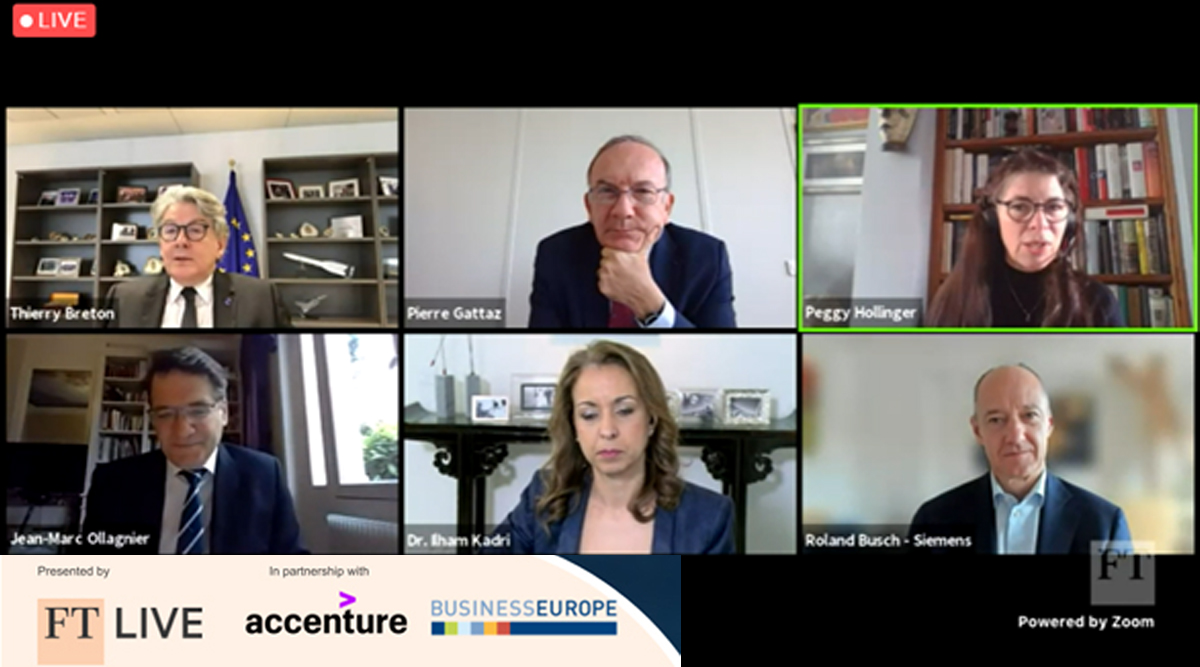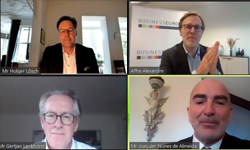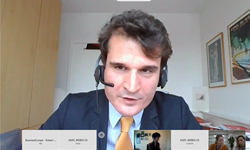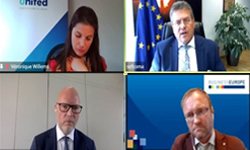BusinessEurope Headlines No. 2021-17
Trust is key for the industrial renaissance in Europe

“Europe is well placed to leverage future growth opportunities. We must have a vision of where we want to go. And an enthusiastic vision”, underlined BusinessEurope President Pierre Gattaz at the panel debate on the industrial renaissance in Europe co-organised by Accenture, BusinessEurope and the Financial Times on 21 May. He highlighted that we have good companies and talented people in Europe and our European model reconciling prosperity, people and the planet is the best in the world. “To be successful Europe needs growth, technology-driven green and digital transitions, skilled people. Trust is key”, Gattaz said. Companies, he added, will only invest in Europe if they feel they can trust public authorities to create a stable and favourable economic environment. Europe should not overburden companies with regulation, especially today when companies are fighting to recover from the COVID crisis and making huge efforts to transform themselves. Read the Reinventing European Industries report, carried out in cooperation with BusinessEurope.
![]() Contact: Nathan Munch
Contact: Nathan Munch
Discussing energy and climate policy with Hungarian Minister of Innovation and Technology
 On Tuesday, 25 May, Markus J. Beyrer, Director General of BusinessEurope, met with Hungarian Minister for Innovation and Technology, Prof. László Palkovics, on the side-lines of the European Council Summit. Topics of discussion included the view of industry on current developments in European energy and climate policy, as well as circular economy issues. Beyrer re-affirmed BusinessEurope’s commitment to the EU’s new climate targets and stressed that the focus now had to shift to the practical implementation - creating the framework conditions for European businesses to be competitive and successful in a decarbonising economy. Key in this regard are the upcoming reforms of the ETS and the envisaged introduction of a Carbon Border Adjustment Mechanism (CBAM). Beyrer stressed the importance of combining increased ambition with strong carbon and investment leakage measures under the ETS. Concerning CBAM, he re-iterated the need for WTO (World Trade Organisation) compatibility and the co-existence of CBAM with the free allocation under the ETS.
On Tuesday, 25 May, Markus J. Beyrer, Director General of BusinessEurope, met with Hungarian Minister for Innovation and Technology, Prof. László Palkovics, on the side-lines of the European Council Summit. Topics of discussion included the view of industry on current developments in European energy and climate policy, as well as circular economy issues. Beyrer re-affirmed BusinessEurope’s commitment to the EU’s new climate targets and stressed that the focus now had to shift to the practical implementation - creating the framework conditions for European businesses to be competitive and successful in a decarbonising economy. Key in this regard are the upcoming reforms of the ETS and the envisaged introduction of a Carbon Border Adjustment Mechanism (CBAM). Beyrer stressed the importance of combining increased ambition with strong carbon and investment leakage measures under the ETS. Concerning CBAM, he re-iterated the need for WTO (World Trade Organisation) compatibility and the co-existence of CBAM with the free allocation under the ETS.
Contact: Steffen Engling
Climate Dialogues webinar explores potential for industry cooperation
 “We need to invest in the right projects at the right time to assure competitiveness and reach the climate targets”, said Joaquim Nunes de Almeida, Director at the Directorate-General for Internal Market, Industry, Entrepreneurship and SMEs of the European Commission at the Climate Dialogues webinar “Industry cooperation: Being stronger together” on 21 May. This was the second interactive seminar organised by BusinessEurope as part of its campaign “Climate dialogues: HOW to reach climate neutrality?”. The event showed how the new industrial strategy and the EU's increased climate ambition can work in tandem. Panellists discussed best practice examples of cooperation models and how their potential can be unleashed across industry. As an example, Holger Lösch, Deputy Director General at the Federation of German Industries (BDI) showcased the hydrogen cooperation between Germany and Australia. Gertjan Lankhorst from the Dutch Association for Energy, Environment and Water stressed the importance of working together in regional industry clusters to define and implement climate targets. The third webinar of the series, which will focus on the future of the EU Sustainable Finance Agenda and the Taxonomy, will take place on 27 May.
“We need to invest in the right projects at the right time to assure competitiveness and reach the climate targets”, said Joaquim Nunes de Almeida, Director at the Directorate-General for Internal Market, Industry, Entrepreneurship and SMEs of the European Commission at the Climate Dialogues webinar “Industry cooperation: Being stronger together” on 21 May. This was the second interactive seminar organised by BusinessEurope as part of its campaign “Climate dialogues: HOW to reach climate neutrality?”. The event showed how the new industrial strategy and the EU's increased climate ambition can work in tandem. Panellists discussed best practice examples of cooperation models and how their potential can be unleashed across industry. As an example, Holger Lösch, Deputy Director General at the Federation of German Industries (BDI) showcased the hydrogen cooperation between Germany and Australia. Gertjan Lankhorst from the Dutch Association for Energy, Environment and Water stressed the importance of working together in regional industry clusters to define and implement climate targets. The third webinar of the series, which will focus on the future of the EU Sustainable Finance Agenda and the Taxonomy, will take place on 27 May.
Contact: Steffen Engling
No FTA can mirror the benefits of the Single Market for services
 “Services account for 75% of GDP, 70% of the workforce, and more than 40% of total trade between the EU and the UK. Due to this close integration, the exit of the UK from the European Single Market has been particularly disruptive to trade in services”, said Luisa Santos, Deputy Director General of BusinessEurope, at an Internal Market and Consumer Protection Committee hearing on the implementation of the EU-UK Trade and Cooperation Agreement (TCA) on 26 May. Santos had been invited to inform Members of the European Parliament (MEPs) about the implications for European business of the UK’s exit from the EU Single Market. During her intervention, Santos made it clear that the TCA was ambitious on services but that no trade agreement could maintain the benefits of the European Single Market. Moreover, she warned that governments should expect further disruptions: “As many services sectors depend on the temporary movement of professionals, the COVID-19 pandemic has masked some of the impact of Brexit in this area. However, as we go forward it will be key that governments provide trainings and clear guidance to companies on such issues as visa requirements and application processes or the recognition of professional qualifications,” she added.
“Services account for 75% of GDP, 70% of the workforce, and more than 40% of total trade between the EU and the UK. Due to this close integration, the exit of the UK from the European Single Market has been particularly disruptive to trade in services”, said Luisa Santos, Deputy Director General of BusinessEurope, at an Internal Market and Consumer Protection Committee hearing on the implementation of the EU-UK Trade and Cooperation Agreement (TCA) on 26 May. Santos had been invited to inform Members of the European Parliament (MEPs) about the implications for European business of the UK’s exit from the EU Single Market. During her intervention, Santos made it clear that the TCA was ambitious on services but that no trade agreement could maintain the benefits of the European Single Market. Moreover, she warned that governments should expect further disruptions: “As many services sectors depend on the temporary movement of professionals, the COVID-19 pandemic has masked some of the impact of Brexit in this area. However, as we go forward it will be key that governments provide trainings and clear guidance to companies on such issues as visa requirements and application processes or the recognition of professional qualifications,” she added.
Contact: Benedikt Wiedenhofer
European and American business call for transatlantic leadership
 On 26 May, BusinessEurope and the U.S. Chamber of Commerce published a joint statement calling on restoring transatlantic leadership. “BusinessEurope and the U.S. Chamber of Commerce are hopeful about the June 15 U.S.-EU Leaders’ Summit. The meeting is long overdue and represents an opportunity to reaffirm shared leadership in addressing our biggest challenges – responding to the pandemic, jumpstarting the global economic recovery, addressing climate change, ensuring digital connectivity, and countering China’s anticompetitive practices at home and abroad”, said BusinessEurope Director General Markus J. Beyrer. The Summit is also a perfect opportunity to resolve several outstanding commercial disputes including as a priority those on large civil aircrafts and steel and aluminium, and to establish a bilateral strategic dialogue.
On 26 May, BusinessEurope and the U.S. Chamber of Commerce published a joint statement calling on restoring transatlantic leadership. “BusinessEurope and the U.S. Chamber of Commerce are hopeful about the June 15 U.S.-EU Leaders’ Summit. The meeting is long overdue and represents an opportunity to reaffirm shared leadership in addressing our biggest challenges – responding to the pandemic, jumpstarting the global economic recovery, addressing climate change, ensuring digital connectivity, and countering China’s anticompetitive practices at home and abroad”, said BusinessEurope Director General Markus J. Beyrer. The Summit is also a perfect opportunity to resolve several outstanding commercial disputes including as a priority those on large civil aircrafts and steel and aluminium, and to establish a bilateral strategic dialogue.
![]() Contact: Eleonora Catella
Contact: Eleonora Catella
Business as a driver of sustainability in the Andean region
 “The trade and foreign investment flows promoted by the EU trade agreements are key drivers of sustainable development in our partner countries. On the one hand, they make sustainable technologies, goods, and services more available and affordable. On the other, European companies active in third countries are vehicles for European social and environmental norms”, Luisa Santos, Deputy Director General of BuisnessEurope, said at a roundtable on trade and sustainability in the Andean region organised by the Spanish Confederation of Business Organizations (CEOE), with the support of the Council of Iberoamerican Entrepreneurs CEIB, the Spanish export and investment agency ICEX, and BusinessEurope on 19 May. The event brought together representatives of business and the Spanish government to discuss the role companies can play in promoting sustainable development in Peru, Colombia, and Ecuador, with which the EU has a trade agreement since 2013. Representatives of six Spanish companies presented relevant initiatives they were involved in as well as problems they faced. “BusinessEurope will use its presidency of the domestic advisory group on sustainable development under the EU trade deal with the Andean region as an opportunity to identify best practices and inform policymakers of barriers that need to be tackled to maximise the positive impact EU business can make in the Andean region”, Santos added.
“The trade and foreign investment flows promoted by the EU trade agreements are key drivers of sustainable development in our partner countries. On the one hand, they make sustainable technologies, goods, and services more available and affordable. On the other, European companies active in third countries are vehicles for European social and environmental norms”, Luisa Santos, Deputy Director General of BuisnessEurope, said at a roundtable on trade and sustainability in the Andean region organised by the Spanish Confederation of Business Organizations (CEOE), with the support of the Council of Iberoamerican Entrepreneurs CEIB, the Spanish export and investment agency ICEX, and BusinessEurope on 19 May. The event brought together representatives of business and the Spanish government to discuss the role companies can play in promoting sustainable development in Peru, Colombia, and Ecuador, with which the EU has a trade agreement since 2013. Representatives of six Spanish companies presented relevant initiatives they were involved in as well as problems they faced. “BusinessEurope will use its presidency of the domestic advisory group on sustainable development under the EU trade deal with the Andean region as an opportunity to identify best practices and inform policymakers of barriers that need to be tackled to maximise the positive impact EU business can make in the Andean region”, Santos added.
Contact: Benedikt Wiedenhofer
Telework: An issue that belongs to the social partners
 The share of teleworkers working from home attained last year levels that were never seen before this crisis. As a result, telework played a positive role in preserving jobs and production in the context of the Covid-19 crisis. However, the fact is that employers and workers were forced into telework. This has been challenging for both sides of industry to adapt to this new reality. Gradual improvements are expected in the coming months in terms of the sanitary situation. This means that many workers will return to work at the usual workplace, particularly the many workers who work in office. In the coming months, we will also be able to better understand how crisis-induced telework will impact on telework preferences of employers and workers in future. The future will be about considering how best to organise voluntary telework in light of the Covid-19 experience. Voluntary telework is an issue that belongs to the social partners, based on the 2002 EU social partners’ autonomous agreement on telework. We look forward to discussing the way forward on telework with the European Trade Union Confederation (ETUC) in the context of our future autonomous European social dialogue activities. These were the key messages passed by Maxime Cerutti, Social Affairs Director, at a hearing held on 21 May in the European Economic and Social Committee on "How the pandemic has affected the labour market".
The share of teleworkers working from home attained last year levels that were never seen before this crisis. As a result, telework played a positive role in preserving jobs and production in the context of the Covid-19 crisis. However, the fact is that employers and workers were forced into telework. This has been challenging for both sides of industry to adapt to this new reality. Gradual improvements are expected in the coming months in terms of the sanitary situation. This means that many workers will return to work at the usual workplace, particularly the many workers who work in office. In the coming months, we will also be able to better understand how crisis-induced telework will impact on telework preferences of employers and workers in future. The future will be about considering how best to organise voluntary telework in light of the Covid-19 experience. Voluntary telework is an issue that belongs to the social partners, based on the 2002 EU social partners’ autonomous agreement on telework. We look forward to discussing the way forward on telework with the European Trade Union Confederation (ETUC) in the context of our future autonomous European social dialogue activities. These were the key messages passed by Maxime Cerutti, Social Affairs Director, at a hearing held on 21 May in the European Economic and Social Committee on "How the pandemic has affected the labour market".
Contact: Maxime Cerutti
Employers call for an EU initiative for boosting training provision
 Any future EU initiative in the area of training should focus on ways to improve and incentivise training provision at EU Member State level. There are a variety of ways that this can be achieved, including through social partner driven approaches, which are the dominant feature and a proven success factor of training provision across Europe. This includes the widespread practice of training funds, which exist in various forms in the Member States, sectorally or cross-industry, and in which social partners play a key role. Our view is that the European Commission’s proposed initiative on individual learning accounts would fall short of addressing the rapidly changing labour market needs. Rather, it is now time for the Commission to seek the tripartite opinion of Member States, employers and workers on how to boost training provision across Europe. These were the key messages given by Maxime Cerutti, Director of Social Affairs, during a dedicated meeting of the European Commission’s Advisory Committee on Vocational Training about a possible future EU initiative on individual learning accounts that took place on 19 May. The key principle that needs to underpin any future initiative in this regard is the need to ensure the labour market relevance of training. Moving forward, European employers are calling for a tripartite opinion of the advisory committee on vocational training (ACVT) on the EU’s approach to training provision. This proposal will be discussed at the June’s meeting of the committee.
Any future EU initiative in the area of training should focus on ways to improve and incentivise training provision at EU Member State level. There are a variety of ways that this can be achieved, including through social partner driven approaches, which are the dominant feature and a proven success factor of training provision across Europe. This includes the widespread practice of training funds, which exist in various forms in the Member States, sectorally or cross-industry, and in which social partners play a key role. Our view is that the European Commission’s proposed initiative on individual learning accounts would fall short of addressing the rapidly changing labour market needs. Rather, it is now time for the Commission to seek the tripartite opinion of Member States, employers and workers on how to boost training provision across Europe. These were the key messages given by Maxime Cerutti, Director of Social Affairs, during a dedicated meeting of the European Commission’s Advisory Committee on Vocational Training about a possible future EU initiative on individual learning accounts that took place on 19 May. The key principle that needs to underpin any future initiative in this regard is the need to ensure the labour market relevance of training. Moving forward, European employers are calling for a tripartite opinion of the advisory committee on vocational training (ACVT) on the EU’s approach to training provision. This proposal will be discussed at the June’s meeting of the committee.
![]() Contact: Robert Plummer
Contact: Robert Plummer
Key messages to Competitiveness Council of 27-28 May
 BusinessEurope sent a letter to the Chair of the EU Competitiveness Council, Pedro Siza Vieira, in relation to key industrial policy and single market topics that will be discussed on 27-28 May. This will be the first exchange on the updated Industrial Strategy by Ministers and BusinessEurope is still analysing it as well. But we support the European Commission’s innovative analysis in the updated Industrial Strategy that stresses the intrinsic links of industrial policy, trade policy and the Single Market. And BusinessEurope also supports the fact that it underlines the central importance of the Single Market to a range of EU policies For our policies to succeed though, we also need a strong commitment to better regulation, which BusinessEurope stresses in its key messages. Better regulation tools have to remain policy-neutral, and the economic recovery requires that the Commission limits new burdens on businesses to the absolute minimum necessary and applies the “1-in, 1-out” principle to all policy initiatives immediately.
BusinessEurope sent a letter to the Chair of the EU Competitiveness Council, Pedro Siza Vieira, in relation to key industrial policy and single market topics that will be discussed on 27-28 May. This will be the first exchange on the updated Industrial Strategy by Ministers and BusinessEurope is still analysing it as well. But we support the European Commission’s innovative analysis in the updated Industrial Strategy that stresses the intrinsic links of industrial policy, trade policy and the Single Market. And BusinessEurope also supports the fact that it underlines the central importance of the Single Market to a range of EU policies For our policies to succeed though, we also need a strong commitment to better regulation, which BusinessEurope stresses in its key messages. Better regulation tools have to remain policy-neutral, and the economic recovery requires that the Commission limits new burdens on businesses to the absolute minimum necessary and applies the “1-in, 1-out” principle to all policy initiatives immediately.
Digital policy will take the central part of a debate, as the Council will take account of progress reports on both the Digital Markets Act (DMA) and Digital Services Act (DSA). In relation to the DMA, we agree with the need to harmonise rules to ensure contestable and fair markets in the digital space where gatekeepers are present. Appropriate and clear criteria are needed to legally define what a gatekeeper is to understand who could potentially become a gatekeeper. In relation to the DSA, we support its goals of achieving a safer, more predictable and trusted online environment. Upholding the “country of origin” principle throughout the application of the DSA is of paramount importance. We agree that the current limited liability scheme of the eCommerce Directive should continue to be upheld and that authority orders should be harmonised to efficiently remove illegal content rapidly. We support harmonisation of the notice and action and trusted flagger mechanisms to ensure efficient removal of illegal goods and content online.
![]()
![]()
![]() Contact: Martynas Barysas
Contact: Martynas Barysas
Full potential in offsetting of regulatory burdens is key for SMEs
 On 26 May, the European Parliament’s SME Intergroup held its exchange on the European Commission’s long-awaited communication “Better Regulation: joining forces to make better laws” with Vice-President Maroš Šefčovič and major business organisations representing SME interests. Participants shared their views on the new better regulation policy measures announced by the Commission and their actual impact on SME environment.
On 26 May, the European Parliament’s SME Intergroup held its exchange on the European Commission’s long-awaited communication “Better Regulation: joining forces to make better laws” with Vice-President Maroš Šefčovič and major business organisations representing SME interests. Participants shared their views on the new better regulation policy measures announced by the Commission and their actual impact on SME environment.
Business organisations stressed the overall support to the European Commission’s efforts to streamline better regulation tools and further contribute to better law-making in Europe. However, they also voiced a number of concerns. Businesses expected the communication to go further in terms of the 1in-1out principle, as there is a significant delay in its actual application. Offsetting burdens and reducing compliance costs are key for SMEs surviving the crisis but also looking for growth in recovery. The Commission commits to assess overall compliance costs of regulation, both administrative and adjustment. However, it clearly commits to offset administrative costs only when applying the “out” part of the above-mentioned 1in-1out principle. “SMEs will lose most from this unused potential in offsetting of regulatory burdens”, underlined Martynas Barysas, Director for Internal Market at BusinessEurope.
Moreover, he shared concerns on how better regulation tools will be used from now on, especially impact assessments. Impact assessments should aid policy and law makers in an objective manner and without prejudice to the policy goals, so they can make informed decisions. “Policy neutrality of better regulation principles and tools is key”, said Barysas. “However, the new communication subjects the better regulation tools and, notably, impact assessments to the Sustainable Developments Goals (SDGs), which is a fundamental change”, he added. This concern was expressed in relation to potential implications on how the SME test and impact assessments in general will be conducted in the future.
“We are not questioning the SDGs. We are concerned if better regulation tools will maintain their neutrality in providing an objective basis for decision makers”, Barysas pointed out. BusinessEurope will issue its full position on the communication “Better Regulation: joining forces to make better laws” in the coming month.
Contact: Martynas Barysas
Responsible AI
 On 26 May, Senior Advisor for the Digital Economy, Patrick Grant, took part in a panel discussion on “Responsible AI for Labour Market Matching”, organised by the World Employment Confederation. Grant presented BusinessEurope’s preliminary views on the newly published Artificial Intelligence Act, the world’s first ever legal framework on AI. He welcomed the intentions of the AI Act to focus on certain high-risk AI practices and stated that “in order to make this risk-based approach more of a reality, we need to further tailor the definitions and scope of the current proposal, to focus on where the highest and most widespread societal damage is likely to arise, predicting the near not far future”. Grant added that there are growing concerns that current classification of high-risk AI systems leads to legal uncertainty and high bureaucracy for companies. This could also hamper the uptake of innovative AI applications, including AI solutions supporting more use in employment contexts and industrial AI. BusinessEurope is in the process of drafting its position on the Artificial Intelligence Act.
On 26 May, Senior Advisor for the Digital Economy, Patrick Grant, took part in a panel discussion on “Responsible AI for Labour Market Matching”, organised by the World Employment Confederation. Grant presented BusinessEurope’s preliminary views on the newly published Artificial Intelligence Act, the world’s first ever legal framework on AI. He welcomed the intentions of the AI Act to focus on certain high-risk AI practices and stated that “in order to make this risk-based approach more of a reality, we need to further tailor the definitions and scope of the current proposal, to focus on where the highest and most widespread societal damage is likely to arise, predicting the near not far future”. Grant added that there are growing concerns that current classification of high-risk AI systems leads to legal uncertainty and high bureaucracy for companies. This could also hamper the uptake of innovative AI applications, including AI solutions supporting more use in employment contexts and industrial AI. BusinessEurope is in the process of drafting its position on the Artificial Intelligence Act.
Contact: Adnane Lachheb
EU Economic Governance Review must reduce procyclicality and ensure enforcement
 Proper enforcement of the Stability and Growth Pact, revised following the conclusion of the ongoing review, preferably with simplified rules and reduced pro-cyclicality and reflecting the post-pandemic context, will be essential to help Member States put their public finances on a sustainable footing and strengthening investment confidence. That will be one of the messages from BusinessEurope to policymakers as they begin to consider restarting the EU Economic Governance Review, which was officially launched by the European Commission in February 2020, but put on hold due to the COVID-19 pandemic outbreak. This week BusinessEurope adopted a new position paper laying out business recommendations and priorities concerning the review of the EU’s economic governance framework.
Proper enforcement of the Stability and Growth Pact, revised following the conclusion of the ongoing review, preferably with simplified rules and reduced pro-cyclicality and reflecting the post-pandemic context, will be essential to help Member States put their public finances on a sustainable footing and strengthening investment confidence. That will be one of the messages from BusinessEurope to policymakers as they begin to consider restarting the EU Economic Governance Review, which was officially launched by the European Commission in February 2020, but put on hold due to the COVID-19 pandemic outbreak. This week BusinessEurope adopted a new position paper laying out business recommendations and priorities concerning the review of the EU’s economic governance framework.
![]() Contact: Malthe Munkøe
Contact: Malthe Munkøe
Calendar 
- 27 May: Climate Dialogues webinar - Sustainable finance: How can it best help the green transition?
- 31 May - 4 June: EU Green Week 2021
- 4 June: BusinessEurope Council of Presidents
Not yet a subscriber? Register here.
Reminder: please have a look at our privacy policy